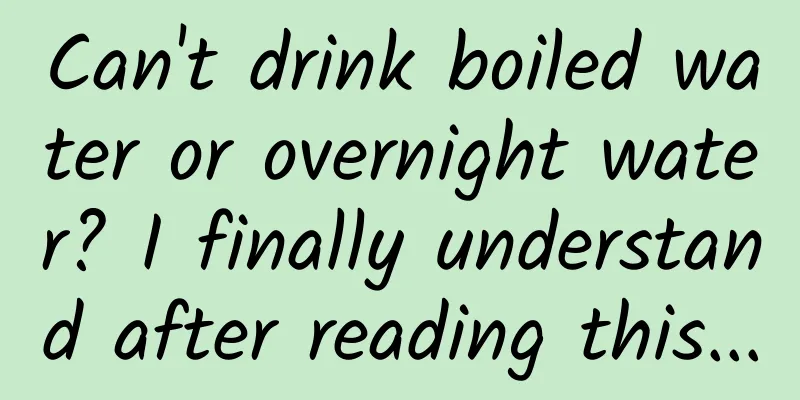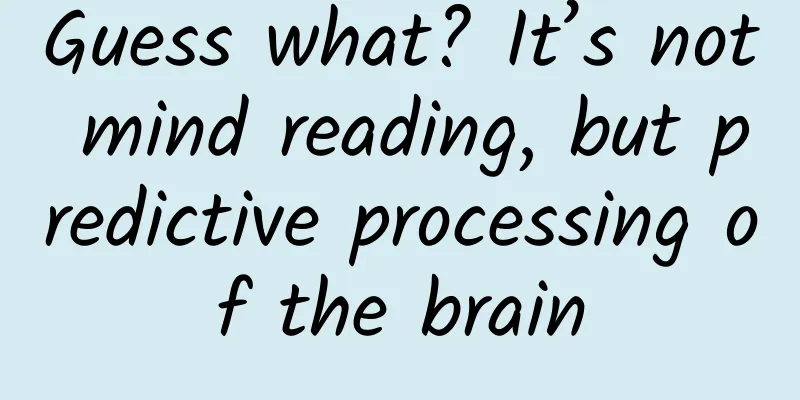Can't drink boiled water or overnight water? I finally understand after reading this...

|
All along “Drink 8 glasses of water every day” It seems to be a common understanding among many people. But some experts said The recommended amount of water per day is 8 glasses (about 2 liters) Probably too high for most people There are also some theories that Do not drink boiled water or overnight water So for ordinary people How much water should I drink every day? Can you drink boiled water or overnight water? Let’s watch together~ Drinking 8 glasses of water a day? You may be drinking it wrong! Studies have shown that the recommended amount of 8 glasses of water (about 2 liters) per day may be too high for most people and exceeds their actual water needs . Moreover, people of different ages, genders, and regions also have different water needs. The study analyzed 5,604 participants from 26 countries, ranging in age from 8-day-old babies to 96-year-olds. The study found that men aged 20 to 35 had the highest daily water turnover of 4.2 liters , while women aged 20 to 40 had a daily water turnover of 3.3 liters . It decreased with age, and in their 90s, the water turnover dropped to about 2.5 liters . However, water turnover is not equal to the actual amount of drinking water we drink every day. For example, a man in his 20s has a daily water turnover of 4.2 liters, which does not mean he needs to drink 4.2 liters of water every day, but an average daily water intake of 1.5 to 1.8 liters . Similarly, for women in their 20s, they may need to drink 1.3 to 1.4 liters of water per day, and the elderly drink even less. Researchers say that the recommended amount of 8 glasses of water per day (about 2 liters) may be too high for most people! If you must insist on 8 glasses of water per day, you can choose a smaller cup. The principle of drinking water you have always adhered to may be wrong 1. Do not drink boiled water or overnight water - Wrong We often hear that "you should never drink boiled water or overnight water because the nitrite content increases and drinking such water frequently can lead to poisoning or even cancer." Many people insist on doing this, but is it really the case? The experimenters conducted a special experiment. They used a stainless steel electric kettle to heat tap water, boiled it 1, 5, and 10 times, then poured it into a cup and let it cool naturally. They then tested the nitrite content in the water after 0 hour, 24 hours, and 48 hours. The experiment found that with the increase in the number of heating and boiling times, the nitrite content in the water tended to increase slightly . After being placed for 48 hours, the maximum nitrite content was 0.014 mg/L, but it is still far from the reference limit of 1 mg/L nitrite in China's national standard for drinking water. So from this point of view, the so-called "thousand-boiled water" and "overnight water" can be safely drunk. 2. Drinking lots of water after a cold will help you get better quickly - Wrong When you have a cold, people around you often advise you to drink more water to get better faster. However, many epidemiologists point out that if you drink a lot of water in a short period of time when you have a cold, it may cause dehydration. When you have a cold, your body will fight the virus by having a fever. This process will cause a large loss of water in the body, and it will also take away electrolyte components such as sodium and potassium. If you only drink a lot of boiled water at this time, the electrolyte elements such as sodium and potassium in the body will be diluted. When the sodium concentration in the body drops too much, people will experience dizziness, fatigue, etc. At this time, the brain will automatically send a signal to excrete excess water from the body through urine, sweat, etc. to meet the needs of electrolyte balance in the body. This is what is medically called "spontaneous dehydration." Therefore, you cannot just drink a lot of water when you have a cold. While drinking water, you must also supplement enough electrolytes to help relieve cold symptoms. 3. Drinking weak alkaline water is healthier - Wrong Although the "acid-base constitution" theory has been proven to be pseudoscience, there are still sayings that "weakly alkaline water is good for health" and "alkaline water makes the blood alkaline". Many people believe it and buy alkaline water to drink and buy alkaline water filters. In fact, the weakly alkaline water we often talk about refers to water with a pH value slightly greater than 7. The human body's internal environment is relatively balanced and stable, and the pH value is generally between 7.35 and 7.45. The human body's internal environment will not change its own pH after drinking acidic and alkaline substances that the human body can withstand. Moreover, after drinking weakly alkaline water, it will be neutralized inside the gastrointestinal tract and will not be absorbed by the body. At present, there is no sufficient scientific basis for concepts such as weak alkaline water and acid-base constitution. Concepts such as weak alkaline water is good for human health and the human body constitution is acidic or alkaline are still not supported by sufficient scientific evidence. 4. Drinking water before meals can help you lose weight - Wrong Many people have heard that drinking water before meals can help lose weight, so they insist on doing it. But in fact, drinking water before meals alone cannot solve the problem of weight loss. In fact, "drinking water before meals" is somewhat similar to what we often say "drinking soup before meals". Although it can increase satiety and reduce food intake, it has a certain weight loss effect, but it is important to drink enough. At least the amount should be "body weight × 30~35". For example, a 50 kg person should drink at least 1500 ml, but drinking 500 ml at a time before each meal will easily dilute the gastric juice and affect digestion. 5. Drinking purified water frequently will cause mineral deficiency in the body - Wrong Many people have heard that "drinking purified water frequently will lead to a lack of minerals in the body", so many people insist on choosing mineral water. In fact, drinking water to supplement minerals is not a good idea. Many mineral waters will indicate the content of calcium, magnesium, and potassium on the packaging, and specifically claim in the promotion that "the water contains calcium, magnesium, potassium and other natural minerals and trace elements required by the human body", giving people the impression that this water is an important source of calcium, magnesium, and potassium. In fact, compared with food, water does not contribute much to calcium, magnesium, and potassium. In addition, there are some bottled waters on the market labeled "drinking natural water" or "drinking natural spring water" that can easily be mistaken for mineral water, but they are not. Drink water correctly and remember these 5 points 1. Don’t wait until you are thirsty to drink You cannot judge whether you need to drink water based on whether you are thirsty or not. When we are thirsty, the body has lost 1% to 2% of its water, and at this time, the body is already dehydrated. In fact, thirst is not a very sensitive indicator. When the body loses 2% to 4% of its water, the body is already in a state of dehydration while feeling thirsty, which is manifested by less urine and dark yellow urine . At this time, work and cognitive abilities will be reduced. In addition, if you feel extremely thirsty, dry skin, chapped mouth and tongue, hoarseness, and general weakness, you may already be in a state of moderate dehydration. 2. The water temperature is most suitable at 35℃~40℃ For most people, drinking water at 35℃ to 40℃ is more suitable, because this is close to the temperature of the human body, which can make the gastrointestinal tract more comfortable. People who are afraid of cold can choose to drink water with a slightly higher temperature, but it is best not to exceed 50℃. 3. Drink slowly and in small sips instead of guzzling it Many people drink a lot of water at once, but this kind of large amount of water drinking at one time will increase the burden on the gastrointestinal tract. The recommended way to drink water is to drink a small amount of water multiple times , and distribute the total amount of water you drink every day throughout the day, about 200 ml each time . You can also drink a little water when you have nothing to do, and you can also drink some water appropriately when you eat. 4. Never use beverages instead of water Many people always feel that boiled water has no taste and prefer to drink beverages instead of water. However, drinking too much sugary drinks can easily lead to obesity, which in turn brings more health problems and is not good for dental health. In fact, boiled water is the best drink in daily life, and boiled water is the best among all the waters. 5. Try to drink less ice water even when it’s hot. Too cold water can irritate the heart, because low-temperature water can cause the coronary arteries to contract,** affecting the heart's work, which is not conducive to blood circulation and can increase the risk of angina pectoris, myocardial infarction and other diseases. ** Especially for patients with coronary heart disease and hypertension, pay attention to the water temperature not being too low. If you really don't want to drink hot water, the water temperature should be between 20℃ and 30℃. It’s time to drink water at these 8 moments 1. After getting up in the morning The human body loses about 450 ml of water every night, and will be in a physiological state of dehydration after getting up in the morning. It is best to drink a glass of warm boiled water on an empty stomach before eating, which can dilute the blood and improve the dehydration at night. 2. Before going to bed at night Don't drink too much water before going to bed, otherwise frequent waking up at night will affect your sleep, but you can't not drink water either. You should drink a few sips before going to bed. Because when people are asleep, the body loses water, causing the water content in the blood to decrease and the blood viscosity to increase. Drinking some water before going to bed can alleviate this phenomenon, thereby reducing the risk of cerebral thrombosis. In addition, it is best for the elderly to always have a glass of water by the bed before going to bed, and drink a few sips immediately when they feel thirsty. 3. After taking a bath Many people feel thirsty after taking a bath, so they pick up a glass of water and drink it all in one gulp. However, they do not know that taking a hot bath will increase blood flow, and drinking too fast will be bad for health, especially for the elderly. At this time, you should drink a glass of warm water in small sips and slowly. 4. Turn on the air conditioner for half an hour The dry air in the air-conditioned room can easily cause the body to lose water, dry the mucous membranes in the nasal cavity, and even cause bronchitis. Therefore, if you stay in the air-conditioned room for more than half an hour, you should replenish water in time, such as boiled water, mineral water, lemonade, etc. 5. Half an hour after meal Do not drink water immediately after a meal, otherwise it will dilute the saliva and gastric juice, weaken the activity of proteases, and affect digestion and absorption. It is recommended that ordinary people drink about 200 ml of water half an hour after a meal, and drink it in small sips. Frequent and large amounts of water can easily cause heartburn. People who are prone to heartburn should drink 3 to 4 sips every 20 to 30 minutes, 2 to 3 hours after a meal. 6. When you are upset Adrenaline is often called the "pain hormone". When a person is in pain and irritability, adrenaline will surge. Like other body toxins, it can be excreted from the body with water. Therefore, when you are in a bad mood, you might as well pour a glass of warm water, sit in your seat and drink it slowly, and your mood will be much more relaxed. 7. During exercise Exercise consumes a lot of water, especially for children, who need more water than adults. In addition to drinking water before exercise, you should also drink water every half an hour during exercise . 8. After eating salty food Eating too much salt can lead to high blood pressure, reduced saliva secretion, oral mucosal edema, etc. If you eat too much salt, the first thing to do is to drink more water, preferably boiled water or lemon water, and try not to drink sugary drinks or yogurt, as sugar will increase thirst. More than 90% of light soy milk is water, and it is rich in potassium, which can promote sodium excretion, and is also a good choice. |
<<: Searching for "MOSS" in the real world (Part 2): Five basic requirements for quantum computers
>>: Carbon Science | What is the grid emission factor in the dual-carbon economy?
Recommend
After beating the world's major car companies, it rebuilt a business empire: new energy aircraft!
Everyone has a different answer to what a legend ...
The battle for volume in November, techniques to increase volume in the financial industry!
The November sale is just around the corner, and ...
Which part of the body is most susceptible to the new coronavirus? These two places are most likely to be infected with the new coronavirus!
As the new coronavirus has the risk of human-to-h...
Jaguar Land Rover's parent company invested $900 million in Faraday Future, but can Jia Yueting really turn things around?
Looking at the present, no matter how short of mo...
15 Children's Day copywritings!
Children's Day is becoming more and more live...
Animals are infected with the new coronavirus again. How can humans defeat the new coronavirus?
Recently, the Mongolian National Center for Zoono...
Is 360's sky-high price for purchasing a domain name just the willfulness of a wealthy person or is there some other hidden story?
[[127445]] On February 4, 2015, Chinese Inter...
Attached case | By promoting information flow in this way, the conversion rate can be increased by 50% without any pressure!
A few days ago, we conducted a small survey in th...
Changjiang Automobile has not ended its money-burning model despite unsatisfactory profits
Chen Guozhang's "transfer" from a s...
"Short-term Hot Money Training Course" teaches you how to trade stocks
Course Contents: 01: How to find high-performance...
Mastering Scalable and Maintainable Applications: A Comprehensive Guide to 12-Factor Application Development
1*vhxOhTuKSyuuAKu-nUQ5SA.jpeg In today's fast...
Why is the gaming market segment always the life-saving straw for hardware manufacturers?
Starting from the first half of this year, China&...
HTC and Samsung in the past, Apple today: The unspoken rules that mobile phone manufacturers will understand only after the cold winter
On June 7, 1742, German mathematician Goldbach pr...
Altay Mini Program Development Company, how much does it cost to develop a car mini program?
According to industry insiders, mini programs wil...
Heavy rains have hit many parts of my country, and dead earthworms can be seen everywhere! Will the population decrease?
Since the beginning of summer in 2024, many parts...









![A comprehensive guide to App promotion and operation knowledge: [Data Analysis]](/upload/images/67cc3ef8ee6ff.webp)